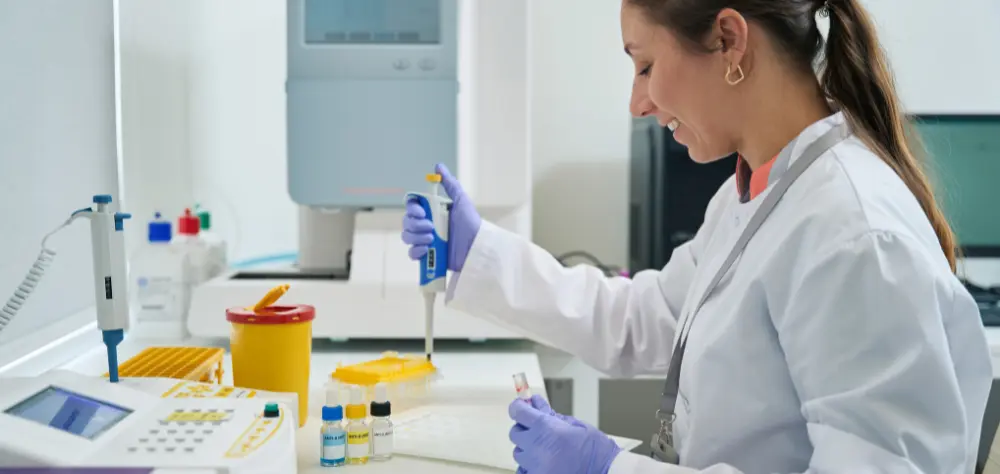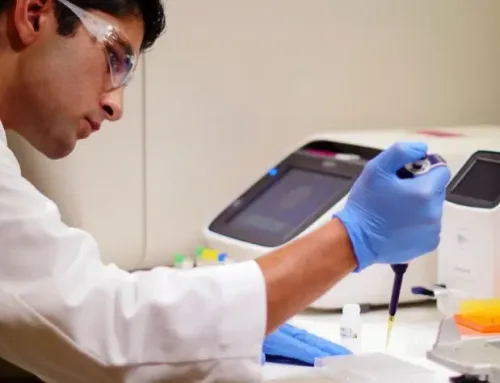How Long Does It Take to Become a Geneticist? A Step-by-Step Guide
How long does it take to become a geneticist? With careers in genetics growing in demand due to advancements in genetics and genomics, the timeline can vary. As fields like gene therapy and precision medicine revolutionize healthcare and research, it’s an exciting time to pursue a career in genetics.
If you’re wondering how long it takes to become a geneticist, you’re not alone. While the path requires dedication and time, the rewards—like contributing to life-changing research—are well worth it.
At Southern California University of Health Sciences (SCU), our Master of Science in Human Genetics and Genomics (MSHGG) offers an accelerated option, allowing you to complete your degree in just one year and jump-start your career!
Careers in Genetics Explained: What Do Geneticists Actually Do?
Careers in genetics are diverse and impactful, offering exciting opportunities to explore genes, heredity, and genetic disorders. Whether in research, healthcare, or even law enforcement, geneticists play a crucial role in advancing our understanding of biology and improving lives.
Understanding the Role of a Geneticist
At the core, geneticists study genes—how they are inherited, expressed, and influence traits. Their work involves analyzing DNA to uncover the causes of genetic disorders, tracking hereditary diseases, and finding innovative solutions in genetics.
Types of Geneticists
There are various paths within genetics, each with its unique focus and contributions to the field. Below are some of the key career tracks for geneticists:
Research Geneticists
These professionals work in academic settings or industries like biotechnology, focusing on discovering new insights about genes. Research geneticists may explore how genes are regulated, develop gene-editing techniques, or work on new therapeutic interventions.
Clinical Geneticists
Clinical geneticists work directly with patients, diagnosing and managing genetic conditions. They interpret genetic tests to provide crucial insights into hereditary diseases and guide personalized treatment plans.
Genetic Counselors
These specialists help individuals and families understand their genetic risks. They provide support and guidance for those undergoing genetic testing and help interpret results in relation to health, pregnancy, and family planning.
Forensic Geneticists
In law enforcement, forensic geneticists use DNA analysis to solve crimes, identify victims, and establish familial connections. Their work is essential for criminal investigations and paternity cases.
Why Timing Matters
The time it takes to become a geneticist varies depending on the career path. For instance, becoming a research geneticist may require more time in academia, while genetic counselors often follow a different, specialized route. Choosing a career path early can help streamline the educational journey.
Your Path to a Career in Genetics: A Step-by-Step Guide
Becoming a geneticist is an exciting, lucrative and rewarding journey, especially given the rapid advancements in genetics and genomics today. Whether you aim to enter healthcare, research, or biotechnology, here’s a breakdown of the steps needed to embark on this career path.
Step 1: Earn a Bachelor’s Degree in a Related Field (4 Years)
Starting with a solid foundation is key. Earning a bachelor’s degree in a relevant field will introduce you to the basics of genetics and open doors to more advanced opportunities.
- Relevant Majors: Common undergraduate majors include Biology, Genetics, Molecular Biology, or Biochemistry.
- Key Coursework: Look for courses in genetics, chemistry, biology, statistics, and bioinformatics.
- Gaining Experience: Participate in internships, lab work, or research projects during your studies to gain valuable hands-on experience and set yourself apart.
Step 2: Obtain a Master’s Degree in Genetics or a Related Field (2-3 Years)
While a bachelor’s degree might get you started, many advanced roles in genetics require further education.
- Is a Master’s Degree Necessary?: For those looking into research or clinical roles, a master’s degree is often essential, providing specialized knowledge and advanced lab skills.
- Master’s Programs: There are numerous master’s programs to choose from, each offering different focuses, from molecular genetics to genetic counseling.
- SCU’s MSHGG Program: Our Master of Science in Human Genetics and Genomics (MSHGG) is a great option, allowing you to complete the degree in just 1 year, making it a faster route into the field.
Step 3: Pursue a Doctoral Degree (Ph.D.) in Genetics (4-6 Years)
For those aiming to lead in research, teach at the university level, or take on leadership roles in biotechnology, a Ph.D. is typically required.
- When is a Ph.D. Required?: Careers in academia, high-level research, or biotechnology leadership often necessitate a Ph.D.
- Time Commitment: Ph.D. programs generally take 4 to 6 years, depending on your research pace and topic.
Step 4: Consider a Medical Degree (M.D.) for Clinical Geneticists (4 Years + Residency)
If you’re interested in working directly with patients to diagnose and manage genetic conditions, becoming a clinical geneticist may be the right path.
- Geneticists in Medicine: Clinical geneticists typically attend medical school and complete a residency in genetics, diagnosing hereditary disorders and developing treatment plans.
- M.D. Program Overview: Medical school takes 4 years, followed by a 2-3 year residency in genetics.
- Alternative to M.D.: If you’re drawn to patient interaction but not medical school, genetic counseling is another option. It requires a master’s degree in genetic counseling, which takes about 2-3 years.
Step 5: Complete Postdoctoral Research or Specialized Training (Optional, 2-3 Years)
For research-focused geneticists or those entering highly specialized fields, postdoctoral research or fellowships may be required.
- When Postdoctoral Work is Necessary: If your goal is to secure a position in academia or high-level research, postdoctoral training is often essential.
- Fellowships and Specialized Training: Clinical geneticists might also need to complete a fellowship in medical genetics, which adds 2-3 years of focused training.
Step 6: Gain Licensure or Certification (Varies by Career Path)
Once your educational training is complete, the final step is obtaining the necessary certifications or licensure for your specific career path.
- Licensing for Clinical Geneticists: Clinical geneticists must pass board certification exams before they can practice.
- Certification for Genetic Counselors: Genetic counselors are required to pass the American Board of Genetic Counseling (ABGC) exam after completing an accredited master’s program.
Ready for a Genetics Career? SCU’s MSHGG Gets You There Faster
At SCU, our Master of Science in Human Genetics and Genomics program is designed to get you career-ready in just one year. With a comprehensive curriculum, real-world applications, and flexibility for working professionals, SCU offers an accelerated path to becoming a geneticist.
SCU’s Comprehensive Curriculum
Our MSHGG program covers a wide range of topics, from foundational genetics to cutting-edge genomic technologies, ensuring that students are well-equipped for diverse roles in healthcare, biotechnology, or research.
- Classical genetics: Learn the fundamental principles of heredity and gene function.
- Advanced genomics: Gain expertise in technologies like CRISPR, gene editing, and bioinformatics.
- Interdisciplinary approach: Integrate your genetic knowledge into various fields like precision medicine and population health.
Accelerated Learning Path
Unlike traditional master’s programs that can take up to two years, our program allows you to complete your degree in just one year. This accelerated path helps you advance your career faster without sacrificing the depth or quality of education.
Flexibility for Working Professionals
Our master’s program is fully online, making it accessible for busy professionals who want to advance their careers without putting their current responsibilities on hold. You can balance work, family, and education while moving toward your goal of becoming a geneticist.
- 100% online format for maximum flexibility.
- Study at your own pace while managing other commitments.
- Designed for professionals who need a balance between work and education.
SCU’s Path to a Genetics Career: Start Yours Today
How long does it take to become a geneticist? SCU’s Master of Science in Human Genetics and Genomics program offers a fast, comprehensive path to join this rapidly advancing field. Covering everything from classical genetics to cutting-edge genomic technologies, you’ll be prepared for diverse roles in healthcare, biotechnology, and research.
The 1-year accelerated learning path and fully online format make our program the ideal choice for busy professionals eager to advance quickly. Ready to jumpstart your career? Read up on our admission requirements and apply today to begin your journey!
FAQs
Which careers in genetics offer the best growth opportunities?
Careers in genetics with high growth potential include genetic counseling, biotechnology research, clinical genetics, and forensic genetics. With advancements in gene therapy and personalized medicine, these fields are experiencing significant demand.
How long does it take to become a geneticist?
Typically, a bachelor’s degree in genetics takes four years, a master’s degree takes an additional two to three years, and a Ph.D. can take four to six years. Programs, like SCU’s MSHGG, allow you to complete a master’s in just one year.
What qualifications are needed to become a geneticist?
To become a geneticist, you typically need a bachelor’s degree in biology or genetics, followed by a master’s or Ph.D. in a related field, depending on your career goals. Clinical geneticists may also need a medical degree.
Can I work while pursuing a master’s degree in genetics?
Yes! Many programs, especially online ones, are designed for working professionals. They offer flexibility so you can balance education with work and personal commitments.
Related Posts





